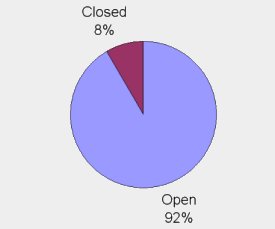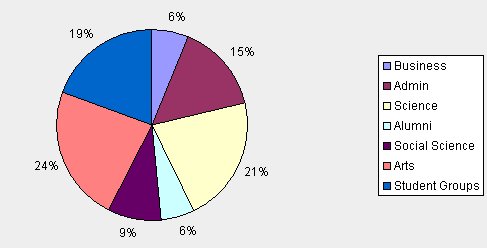|
Facebook is another university invention that has since become a global tool. Originally it was limited to just American universities, but later expanded to include worldwide universities and colleges, and then became accessible to the general public. Since its inception, Facebook has grown to become the primary social media tool for written communication amongst large groups, outdoing blogs and sometimes even email.
Post-secondary schools have embraced Facebook for a variety of both professional and personal uses. Professionally, it is now a widely used tool for advertising their programs, athletic teams, and alumni, often creating new Facebook groups for every academic year (in these cases, only the general Facebook group has been included, and not for example, every graduating class group from 1998-2008). Also not included are personal Facebook groups, created by one individual to promote a certain cause and not necessarily related to that school. However, even with these restrictions, there are still almost 1400 'official' Facebook groups in Canada that relate to universities and colleges. In fact, there are only a handful of schools in Canada that have NOT used Facebook to some degree (mostly smaller private colleges).
Facebook is meant to bind people together by sharing information and communicating updates instantly. Because of this, most Facebook groups are 'open' (ie. accessible to the general public). This means that even if you are not a college or university student, you can still participate in the lifestyle vicariously. This has some pitfalls, as with other types of social media there is a lack of privacy, which has led to some legal issues. Due to this, some Facebook groups have chosen a 'closed' format (ie. you can become a member by invitation only), and within post-secondary Facebook groups, just less than 10% of groups choose this route.
Open vs. Closed Facebook Groups

Facebook has become another valuable tool when it comes to prospective students shopping for a post-secondary school. You can now find out if that school's music program is all that great, which society to join, and where the social action is going to be. Knowing this, many schools now have recruitment Facebook groups, where they advertise their school's attributes, mention which cities that school's representatives will be visiting, or make it easier for you to schedule a personal visit. And Facebook is making the transition from high school to college or university easier. Now if you have to pack up and move to a new city, you will already have several Facebook friends doing the same thing, which makes the first-year experience much more enjoyable.
Prevalence of Facebook Groups in Canadian Post-Secondary Schools

Generally speaking, school size is roughly related to the number of Facebook groups it generates. However, as with blogs, some schools have disproportionately more Facebook groups than the average. The University of Manitoba and the University of Waterloo (both small schools) have 84 and 85 Facebook groups respectively, many more than the average of 5. The University of Ottawa (a medium school) has 63 Facebook groups, and the average for a medium school is 26. And the University of Toronto (a large school) has 99 Facebook groups, compared to the average of 37. Overall it is the Universities of Manitoba and Waterloo that have the most number of Facebook groups per-capita.
Type of Facebook Groups in Canadian Post-Secondary Schools

Post-secondary schools employ several types of Facebook groups:
- Administrative: These types of Facebook groups relate to Administrative Units at a post-secondary school, such as language centers, libraries, staff, and recruitment departments. It can also refer to a general Facebook group that is non-specific. Most post-secondary schools have at least one administrative Facebook group's general all-encompassing one that is used by all members of that school and is not specific. Administrative groups make up about 15% of all Canadian post-secondary Facebook groups.
- Alumni: These are the preferred online tool when it comes to keeping in touch with former students. Almost every post-secondary school will also have one of these types of Facebook groups in addition to the general Facebook group. Alumni groups can be further broken up according to faculty or by graduation year. Despite most post-secondary schools having at least one such group, they only make up 6% of post-secondary groups, due to the fact that so many other groups (especially academic ones) are possible for each school.
- Student groups: Societies, non-academic clubs, athletics, student unions, etc. make up this group. About 20% of post-secondary Facebook groups will be of this nature, reflecting the usefulness of Facebook for announcing meetings, sporting events, social activities, etc. The vast majority of this group consists of various cultural clubs (given the great diversity of cultures at most universities and colleges) and appears to be the primary method of communication within these types of Clubs.
Academic Facebook groups
Academic groups make up the remaining ~60% of post-secondary Facebook groups. Since this group is so large and varied, it's been broken down further into 4 academic groups: sciences, arts, social sciences, and business. These Facebook groups reflect specific departments or Faculties, and also academically inclined clubs. This broad grouping has the greatest chance of using closed Facebook groups, due to the course-specific and potentially sensitive nature of some of these groups.
- Science Facebook groups make up 36% of academic Facebook groups, and 21% of the overall groups. Most post-secondary schools known for their science programs (eg. Acadia, Dalhousie, Waterloo, etc) will have at least one science Facebook group, if not more. In fact Waterloo has the 2nd highest number of science groups (27 ... University of Manitoba has 28), reflecting their strong computer, math, and robotics programs.
- Arts Facebook groups make up 39% of academic Facebook groups, and 24% of the overall groups, edging out sciences slightly. The University of Toronto, with its varied arts programs and 3 campuses, has the highest number of Facebook groups (21), just edging out the University of Waterloo with 20.
- Social Sciences Facebook groups make up 15% of academic groups and 9% of the overall groups. The University of Calgary and the University of Windsor, with 8-10 Facebook groups devoted to social sciences, has the highest, mostly relating to their Law Schools.
- Finally, business Facebook groups make up 11% of academic groups and 6% of the overall groups. The University of Manitoba, with 7 groups, has the most, mostly relating to their School of Business. Other prominent universities and colleges with a well-known business school, such as Saint Mary's University or Ryerson University, also have numerous Facebook groups devoted to their business school.
Facebook usage as a social media tool for post-secondary institutions is expected to increase, especially as new features are added. Some schools are already advertising their Facebook groups on their homepage as a primary research tool for prospective students, and making entire webpages devoted to links to their various social media. Static webpages are becoming outdated, and content this is updated daily, or even hourly, is becoming the new norm.
Social Media Articles
Our ongoing series on social media in post-secondary schools in Canada will cover how colleges and universities are employing these new online tools to help promote their schools and related activities. Our first three articles reveal the extent of these rapidly growing social media tools. These include:
- Blogs: Blogs have truly enhanced the post-secondary experience...no longer do you have to actually attend school to find out what's going on, now you can just log onto your school's news blog to find out the latest information.
- Facebook: Since its inception, Facebook has grown to become the primary social media tool for written communication amongst large groups, outdoing blogs and sometimes even email.
- Videos: Whereas Facebook and blogs are very new and represent 2-way communication in real time, videos represent a more 'traditional' method of communication.
|
|